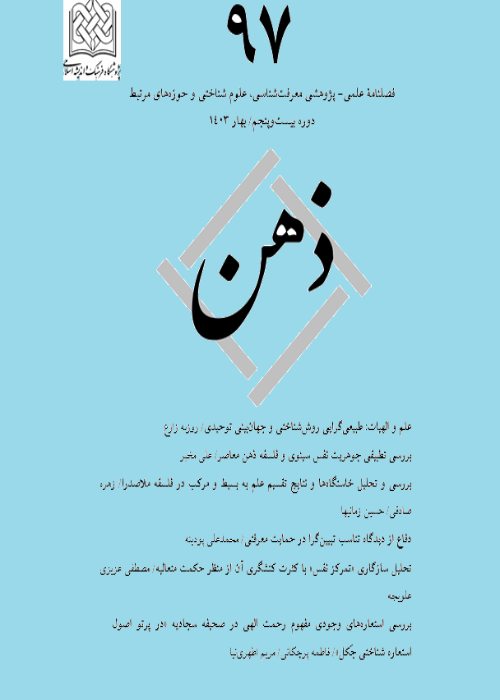Explanation and Comparison of the Process of Realization of "Sensory Perception" from the Point of View of " Neo-Sadraei’s Epistemology" and "Cognitive Psychology"
The apparent (zahir) senses are the first means of encountering and perceptual communication with sensations, and sensory perception is the first stage of the process of acquiring knowledge from the environment for humans as a subject. This stage is known in epistemological sources as a condition for the realization of other sciences in the next stages. Also, a large share of cognitive psychology research is dedicated to this field. But regarding the function of the senses, as perceptive. Both cognitive psychology, as a relatively young science, and the modern epistemology, as a new approach derived from Islamic philosophy, have presented analyzes in this regard.
The research method in the cognitive psychology is based on empirical appearance; But in practical terms, the presented analyzes are performed by using the ability to analyze and transform ideas into propositions and transform propositions into theories by inner perceptive powers, especially reason. On the other hand, NeoSadraei’s epistemology uses the method of intellectual analysis that observes the phenomena that occur in the realm of the apparent senses. Therefore, there is a common area between the two sciences in the research method. By referring to the written sources of the two mentioned sciences, focusing on the problem of the realization process of sensory perception, this research tries to obtain the views of the two sciences regarding the process of realization of sensory perception and present them after comparing and matching the common issues and differences between these two approaches. Both sciences consider sensory perception as the reality indicating the environment and sensations; but there are differences in explaining the function of components and its process.
The research carried out led to the conclusion that NeoSadraei’s epistemology, in explaining the process of sensory perception, introduces the apparent senses as the agent under the command of "soul" as the main manager and user of the process of perception, and cognitive psychology tries, the process of realization of perception, cognition and sensory recognition to the function of cognitive tools in the experimental dimension. Neo-Sadraei’s epistemology did not independently and comprehensively deal with the aspect of experimental and laboratory functions of body parts (external organs, nerves and brain); However, it has provided a diagram of the connection and interaction of physical and metaphysical principles in the process of realizing all kinds of knowledge, including sensory perception; But cognitive psychology, while paying careful attention to the senses and organs and perceptual parts of the body and presenting the functions of the external senses and physical organs and significant achievements in this aspect, analyzing and drawing the relationship between sensory aspects and extrasensory aspects and factors, in the process of realization of cognitions; including sensory perceptions, did not present or stopped at this stage.
The result is that Neo-Sadraei’s epistemology in the realm of attention and precision in the material performance of perceptual tools, especially the apparent senses that are directly related to sensations, needs to complete the discussions and add the findings to the product of its previous traditional research, and on the other hand, cognitive psychology needs going beyond the material realm and the scope of the analyzes focused on the material aspect of mere perceptual tools, including the visual senses, in order to study more commonalities in order to reveal the details of the process with a more accurate and joint use of the findings and important common questions that can be investigated between these two sciences. It is necessary to realize all kinds of knowledge for the study of harmony and the discovery of new horizons.
- حق عضویت دریافتی صرف حمایت از نشریات عضو و نگهداری، تکمیل و توسعه مگیران میشود.
- پرداخت حق اشتراک و دانلود مقالات اجازه بازنشر آن در سایر رسانههای چاپی و دیجیتال را به کاربر نمیدهد.


